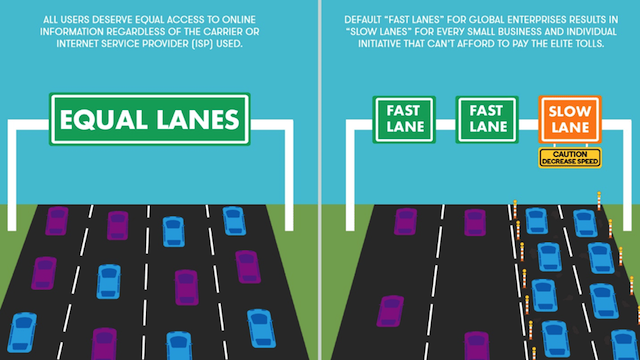NET NEUTRALITY

Net neutrality is the idea that internet service providers like Comcast and Verizon should treat all content flowing through their cables and cell towers equally. This means they should not be able to move data faster while blocking other material from moving as fast. Companies are not able to block users from using things like Youtube, or slow down Netflix or Hulu, in order to encourage you to keep your cable package or buy a different video-streaming service.
Net neutrality advocates have argued that keeping the internet open is crucial for innovation. If providers are selective, new companies and technologies might never have the chance to grow. For example, if internet providers blocked or severely limited video streaming in the mid-2000s, Netflix or YouTube might not exist today. Others describe that net neutrality lets a handful of large telecommunications companies dominate the broadband market, which puts an enormous amount of power into their hands to suppress particular views or limit online speech to those who can pay the most.
The future of net neutrality depends on Congress, the courts, and the states. Twenty-one state attorneys general sued the FCC in January 2018 to block the new rules and restore the old ones, along with other consumer-advocacy groups. A federal court ruled that the agency couldn’t override state-level net neutrality laws.
Learn more about net neutrality HEREINTERNET CENSORSHIP
Internet censorship is the ability to restrict specific websites or online content from being viewed. It can either be an edit, regulation, or law issued by the government.
Internet censorship is appealing because of the reach of the internet regardless of what policies one country creates about allowable content. While countries have made attempts to restrict what is able to be seen, such as Google and China creating a deal over filtering its search engine, accessibility is still the largest obstacle to being able to control what people can find online.
The advantage of allowing internet censorship is that violent, obscene, or dangerous content can be immediately blocked. This protects children from accidentally viewing content that could be scary or harmful to them
A con of internet censorship is how expensive it is. According to research from Darrell West, VP and Director of Governance Studies and the founding director of the Center for Technology Innovation at Brookings, internet shutdowns cost countries $2.4 billion in 2015. The decision to cut connectivity in Egypt cost $90 million.
Learn more about internet censorship HERE
DIGITAL DIVIDE

Digital divide is the gap between demographics and regions that have access to modern information and technology and those that do not. This gap is constantly changing with the development of technology. For example, when digital divide was first used in the late 20th century, it described the gap between those who had cellphone access and those who did not.
Although the number of Americans with access to computers and the Internet increase greatly on a yearly basis, the digital divide also continues to grow at an alarming rate. Sections of society already connected, like higher income, educated White and Asian Pacific Islander households, are adopting newer technologies faster and are connecting even more. On the other hand, groups with traditionally lower rates for internet and computer usage are not up to date with newer technologies.
Digital divide is an issue within many countries, and rural populations are much more likely to be cut off from digital technologies than city residents are. But, nationwide, several federal, state, and local programs have worked to close the digital divide through investments in infrastructure, affordable broadband connections and devices and digital literacy training.
Learn more about digital divide HERE